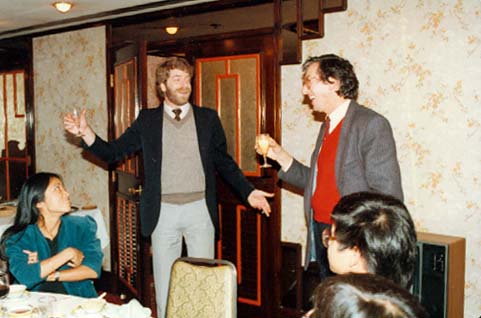Tuesday, July 1, 2008
Luke Hunt: Tough love and cans of beer
The glint in Peter Mackler's eye when he had his hands on a story destined for the front pages of the world's newspapers was as marvelous as it was memorable.
His bearded smile had all the cheek and gusto of a man in his prime, as he struggled to contain himself, for just a few minutes, long enough to hammer out the words faster than the competition.
In Iraq during the 2003 invasion, he was in his element pretty much every day.
For an outsider the race to cover firefights, massacres and the everyday bloodshed of Iraq might sound macabre.
But what stood out amid the mayhem, absurdities and the sheer nastiness of conflict was Peter's moral fibre. It was refreshing.
Nobody had to get hurt for us to have a story. That included the Iraqi civilians, the insurgents, invading soldiers and no more importantly, AFP staff. Not every journalist who works in war zone is like that and Peter was tireless at ensuring our security was as good as it could be and that the senstivities of locals was always respected.
He even gave me an afternoon off once, after a 12-year-old opened fire with an AK-47 as our car stopped at a T-intersection. The kid's inability to handle the recoil meant bullets were landing everywhere except on target; us.
Pete's response was what he called "Tough Love" which meant take the rest of the day off, have a few cold beers and don't miss the morning editorial meeting. That was good enough most of us.
War stories were a dime a dozen and this was where Tough Love was not without foresight.
After the invasion was complete Peter took the lead and shifted the focus of coverage from shoot 'em up war stories to economics, he knew America's future in Iraq -- success or failure -- would largely hinge on rebuilding the country's infrastructure.
At the time many people wanted more flashy bang bang yarns. Others like Peter wanted to tell the sobre truth and that included stories about education, health and transport. How people lived mattered.
Peter Mackler was a brave, stubborn and proud man who preferred to rate his peers by the what they did in the field. I liked that. And he died where he had passionately lived, on the job.
He will always be remembered as a reporter's reporter, an honorable man and to many of us, a friend.
-- Luke Hunt
Hong Kong
His bearded smile had all the cheek and gusto of a man in his prime, as he struggled to contain himself, for just a few minutes, long enough to hammer out the words faster than the competition.
In Iraq during the 2003 invasion, he was in his element pretty much every day.
For an outsider the race to cover firefights, massacres and the everyday bloodshed of Iraq might sound macabre.
But what stood out amid the mayhem, absurdities and the sheer nastiness of conflict was Peter's moral fibre. It was refreshing.
Nobody had to get hurt for us to have a story. That included the Iraqi civilians, the insurgents, invading soldiers and no more importantly, AFP staff. Not every journalist who works in war zone is like that and Peter was tireless at ensuring our security was as good as it could be and that the senstivities of locals was always respected.
He even gave me an afternoon off once, after a 12-year-old opened fire with an AK-47 as our car stopped at a T-intersection. The kid's inability to handle the recoil meant bullets were landing everywhere except on target; us.
Pete's response was what he called "Tough Love" which meant take the rest of the day off, have a few cold beers and don't miss the morning editorial meeting. That was good enough most of us.
War stories were a dime a dozen and this was where Tough Love was not without foresight.
After the invasion was complete Peter took the lead and shifted the focus of coverage from shoot 'em up war stories to economics, he knew America's future in Iraq -- success or failure -- would largely hinge on rebuilding the country's infrastructure.
At the time many people wanted more flashy bang bang yarns. Others like Peter wanted to tell the sobre truth and that included stories about education, health and transport. How people lived mattered.
Peter Mackler was a brave, stubborn and proud man who preferred to rate his peers by the what they did in the field. I liked that. And he died where he had passionately lived, on the job.
He will always be remembered as a reporter's reporter, an honorable man and to many of us, a friend.
-- Luke Hunt
Hong Kong








